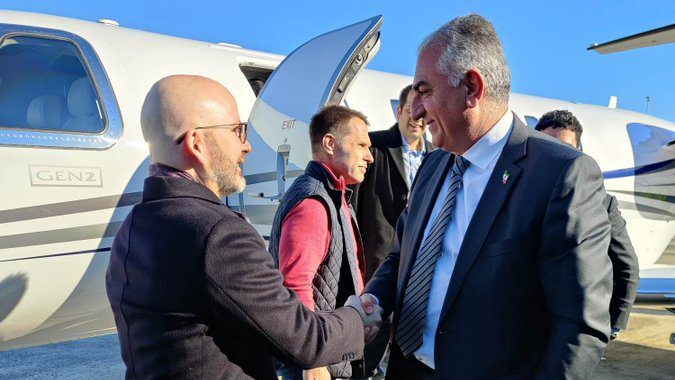Iranian anti-regime protests which started several months ago following the killing of the female journalist Mahsa Amini are continuing to suffer brutal oppression at the hands of their theocratic government. However, the exiled Crown Prince of Iran, Reza Pahlavi, is currently working to rally the cavalry outside the country.
Pahlavi spoke at a conference in the European Parliament on Wednesday, March 1st, coming on the invitation of Sweden Democrats MEP Charlie Weimers. With the cries of supporters ringing through the room, Pahlavi spoke of the unity of the Iranian opposition and called on the EU to support them in their struggle against the current Islamist regime.
Reza Pahlavi is the son of the last Shah (King) of Iran, who fled the country in the 1979 Revolution, which brought the current Islamic Republic to power.
“We are happy to see that after many years of focus on engagement with the current regime,” he said referring to the Ayatollah’s theocratic rule, “international political discourse regarding Iran is turning towards those who represent a democratic alternative on behalf of the true sovereigns of Iran, the Iranian people.”
In the shadow of a regime-led crackdown, the Crown Prince’s speech optimistically focused on the potential of a secular democracy in Iran.
Differentiating between the Iranian People and the Islamic Republic, Pahlavi said that Iranian people are “natural allies of the West.” As a result, he asked the EU not just for “maximum pressure on the Islamic Republic, but also [for] maximum support for our people.” One of the supports he outlined was for frozen Iranian assets to be repurposed for a strike fund, which would help feed protestors in a labour strike which he believed would be critical for toppling the current regime.
The distinction between nation and regime is an important one for Pahlavi, as he believes that “many of the [Islamic Republic’s] leaders… do not to this day see Iran as a nation, but as a vessel to be exploited for the development and export of their revolution.”
Iranian supporters who spoke to The European Conservative asserted that the Crown Prince had the status of a deeply national symbol. “We have had 5,000 years of monarchy in Iran, I love it,” smiled one woman holding Pahlavi’s poster.
Outside parliament, two men held roses as they waited to see Pahlavi. “He’s our king!” one of them said, while the other added, “in my opinion, the kingdom system that we created in Iran is the best choice for Iran.”
However, Mr. Pahlavi was clear about his neutrality towards a potential monarchy. When asked by The European Conservative, he said, “in order to be a coalition builder I have to be neutral and above the fray.” He defined his “mission in life” as being “an agent of transition,” firmly believing in giving the Iranian people the choice to democratically determine their own form of government once freed from Ayatollah’s regime.
But the mission to topple the Islamic Republic requires unity of the opposition as a first priority:
There are monarchists who want me to become the next King, and there are republicans who say “no you should just be a president,” and to both, I say “look, let’s not talk about offices right now … I am not running a campaign.” This is how I get monarchists and republicans on board.
During the conference, Mr. Weimers, who has been an outspoken critic of the current Iranian regime— as well as the EU’s reluctance to support regime change in Iran—denounced the EU’s “lack of imagination,” condemning the bloc’s preference for “dealing with the devils they know.”
Pahlavi responded by pointing out how those in the opposition, unlike the regime, have a deep love of their country:
How could you possibly consider that [opposition to the regime] the devil you don’t [know]? It can’t be evil, it can only be truth. If you trust in Iranian people who are sacrificing their lives in the interests of their own country, instead of a regime that couldn’t care less about the Iranian people, there lies the difference. Whom do you choose to trust more?
This drew applause from his audience. “We shall fight! We shall die! We shall take our country back!” they began to chant in Farsi. “We only trust you, our king!” cried one man. Pahlavi chuckled at this and gestured to the Iranians in the audience, “If there are any devils, know these devils!” he laughed.





